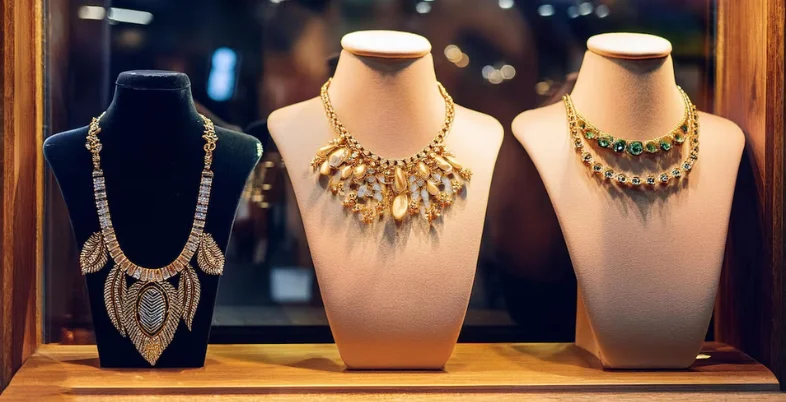While various big box stores and major fine jewellery brands rule the industry, there’s a demand for unique, smaller jewelers. 49% prefer buying their jewellery from small retailers or traders.
Some direct-to-consumer (DTC) brands have created many new firms in the field of jewellery that are creating the market share of stone and pearl jewellery stores.
Starting a jewellery business might seem daunting knowing that the market is already immersed but if you act wisely in setting up a different brand for the online consumers you will pave the way for greater business gains.
This blog will contain all the basics of how to start a jewellery business as well as how to continue selling jewellery on the Internet.
Why Start a Jewellery Business?
- High Demand: Jewellery is continuously in demand for different occasions, including weddings, festivals, and design, making it a profitable business with a consistent market.
- Creative Expression: A jewellery venture permits you to show your creativity with particular plans, catering to a variety of tastes and inclinations.
- Flexible Business Model: You can begin a jewellery trade with different models, such as handmade, customised, or retail, giving you flexibility based on your assets and interests.
- Scalable Growth: The jewellery sector gives critical opportunities for extension, allowing you to move from small-scale endeavors to greater markets, such as online platforms.
- High Profit Margins: Jewellery frequently has high benefit margins, particularly for unique, handcrafted, or luxury pieces, making it a profitable venture.
- Personalized Customer Experience: Offering customized jewellery permits you to build strong connections with clients, leading to repeat business and referrals.
- Global Reach: The jewellery industry offers critical development potential, allowing you to expand from small-scale operations to bigger markets, including online platforms.
- Cultural Significance: Jewellery holds social and emotional value, making it a meaningful item that clients cherish for generations.
- Diverse Target Market: The jewellery industry serves a broad extend of demographics, advertising a variety of items from ordinary pieces to luxury goods.
- Low Initial Investment: Starting a small jewellery business can require minimal venture, especially if you center on handmade or custom designs, permitting you to grow as your business succeeds.
Also Read: Top Direct Selling Companies
How to start a Jewellery business in 9 steps

1. Decide on your jewellery niche
A jewellery line is one of the top ecommerce product ideas. Like every other ecommerce business, you need to be specific with your product offerings. Selecting a niche doesn’t hinder the improvement of your business. It enables you to hone your advertising to reach your target audience more directly. Compared to a wide, general market, niches have fewer competitors, making it simpler for small entrepreneurs to start their own business.
There are a few niche jewellery categories to consider:
- Handmade jewellery: People discover handmade jewellery alluring due to its particular nature, making it difficult to imitate. Although it can be more costly to set up this sort of business particularly since you can not depend on dropshipping you can make yourself a faithful customer base.
- Fine jewellery: Fine jewelries are of high quality and mostly produced from valuable materials such as metals or gemstones. This is largely because fine jewellery is more often than not more costly, and people don’t purchase many at a go, which makes it an even more challenging market for little business proprietors to penetrate.
- Fashion jewellery: Also known as costume jewellery, fashion jewellery highlights a lower cost point than fine gems and is more suitable for normal wear. It’s easier to make, since it can be mass-produced and is more attractive to the general customer.
Your products will depend a lot on your ideal customer demographics. If you need to sell to high-earning individuals trying to find occasion-specific pieces, then you’ll need to create fine jewellery. In case you’d rather sell to middle-class people who want to add more jewellery to their ordinary collection, then fashion jewellery is the way to go.
Now that you’ve conducted the appropriate market investigate, you can start composing up your business plan and considering the sort of jewellery products you’d like to offer, such as:
- Earrings
- Necklaces
- Brooches
- Rings
- Bracelets
- Anklets
- Watches
- Cufflinks
- Engagement rings
- Pendants
2. Create a Business Plan
- Define Your Vision and Goals: Identify with clear and precise wording what you intend to achieve with your jewellery business. For example, the goal may be to create a luxury brand specialising in novelty bridal jewellery or to be the store for customers who seek simple, basic jewellery.
- Target Market Identification: Determine your perfect customer’s age, preferences in terms of clothing style, and buying behaviour. Is it aimed at the young working population seeking cheap polished products or is it attracting high-end clientèle seeking to acquire customised ornaments?
- Financial Projections: Calculate your startup costs, including materials, showcasing, and operations. Extend your income streams and break-even points to ensure your business is financially practical.
- Marketing Strategy: Plan how you’ll advance your business. For example, focus on social media marketing, influencer partnerships, or SEO to drive online activity. Tailor your procedure to your target audience’s preferred stages.
- Operational Plan: Detail your production process, supplier connections, and logistics. Consider whether you’ll handle production in-house, outsource, or collaborate with artisans.
3. Register Your Business
- Choose a Business Name: Select an important, brand-relevant name that reflects your jewellery’s fashion and appeal. Guarantee that it’s accessible and not already in use by checking with local and national trade registries.
- Legal Structure: Choose on the best legal structure for your trade, such as a sole proprietorship, LLC, or corporation. An LLC, for case, gives risk security and is common for little businesses.
- Obtain Necessary Licences and Permits: Depending on your location, you may require a general trade licence, sales tax permit, and possibly a domestic occupation permit if working from home. Ensure you comply with local, state, and federal controls.
- Apply for a Tax ID: Obtain an Employer Identification Number (EIN) from the IRS for tax purposes. This step is noteworthy, especially if you arrange to contract employees or open a business bank account.
- Open a Business Bank Account: Keep your funds organised by separating individual and business reserves. A dedicated exchange account simplifies following expenses, managing cash flow, and preparing taxes.
4. Source Materials and Suppliers
Once you have design concepts for your jewellery line, you’ll need to research potential producers and decide whether or not you need to produce products locally or abroad. If you’re hand-making your plans, you’ll need to buy jewellery-making tools and equipment.
It can be beneficial also to ask other jewellery designers, almost trustworthy wholesale distributors or see into getting a reseller permit so you can forgo paying local deals taxes once you buy in bulk.
5. Design and Develop Your Product Line
If you’re getting into jewellery because it’s your passion, then the product design is the easy part.
If not, there are so many great places to find inspiration, like your favourite jewellery designers, the latest trends, insight from doing market research, and more. If you’re making handmade jewellery, learning the trade via jewellery classes and tutorials will be important.
Once you’ve got your products designed, you would like to figure out how to handle production and procuring supplies in bulk.
6. Set up an e-commerce store

New businesses need to launch an online jewellery store if they want to engage their target market as effectively as possible. Your online storefront should be aesthetic and functional.
Know your goals, budget, and ideal features before selecting an ecommerce platform. Compare prevalent platforms like Shopify, BigCommerce, and Wix. Flexibility is key- your clients should be able to pay via credit card, PayPal, or Apple Pay if you need to optimise your deals. You should also use a format to set up your store and guarantee it’s visually appealing.
Once you’ve chosen on a platform, follow these steps to set up your online store:
- Choose a custom domain name.
- Create product pages.
- Write product page descriptions.
- Use best ecommerce SEO practices.
- Integrate a secure payment gateway.
- Ensure you have adequate customer service options.
- Add sales channels (like Etsy, Amazon, or eBay).
- Manually test the checkout process.
- Confirm your store is functional before making it public.
7. Establish Pricing and Sales Strategy
Researching the prices of similar pieces from competitors could be a great place to start, but it doesn’t need to inform your choice entirely. Think of it as a way to learn what price range clients are expecting and help set competitive costs that fit within your budget.
Once you understand the market price, you can then decide on production costs. For handmade jewellery, consider:
- Materials
- Labour costs
- Tools or equipment needed for production
For mass-produced jewellery, it’s vital to factor in manufacturing costs and transportation and shipping expenses.
The next step is selecting a pricing model that creates sense for your business type. When selling special or personalised jewellery, it might be prevalent to cost based on the complexity of the plan.
When determining your costs, it is vital to take into account additional charges like taxes and shipping expenses. These additional fees can include up rapidly, so it’s vital to include them in your calculations when setting your pricing model.
Carefully choose a profit margin for each product sold that ensures you’re making enough money off each thing while remaining competitive within the marketplace.
8. Develop a Marketing Plan
As a jeweller, you might depend on in-person deals and your ecommerce website deals. It’s vital to use both digital promoting strategies and conventional marketing strategies to develop your customer base.
Digital marketing strategies
When marketing yourself online, try a mix of these digital marketing strategies:
- Email marketing: There are four billion daily email users, making email marketing one of the most lucrative ways to get your online jewellery business in front of customers. Check out these eight email marketing examples for inspiration.
- Social media: Share captivating content that interfaces with potential customers, while also showcasing your items in a polished or laid-back way. The disposition of your messages is determined by the platform you are using, for instance, Facebook, LinkedIn, Tik-Tok, Instagram or any social platform.
- Search engine optimisation (SEO): If one would have to build clients naturally, then there is no other way but to get into SEO marketing. Conduct keyword investigation and compose quality content to rank higher on Google’s search engine results page.
- Influencer marketing: Influencers in your specialty can help you construct credibility and win new clients. Eighty-one percent of consumers have investigated, purchased, or considered acquiring a product after seeing friends, family, or influencers post about it.
Traditional marketing strategies
In case your business model includes producing your own jewellery, take advantage of craft fairs and local markets. Getting your physical jewellery pieces before potential clients is a great marketing strategy, and you can reach out to local boutiques to offer your pieces.
Enlist a designer to create business cards for your jewellery company. You can also take product photos at these events and repurpose them as marketing materials online. Refine your brand’s look and improve credibility with freelance professional product photography.
Other traditional marketing strategies include:
- Television advertisements
- Flyers
- Event marketing
- Print advertising
- Referral coupons
9. Monitor and Scale Your Business
For new businesses, start small by pitching your designs to local boutiques. As you scale, you can work your way up to larger partners. Wholesale still accounts for the bulk of Biko’s overall business, and Corinne has worked with large retailers like Nordstrom, Simons, and Hudson’s Bay.
Another way to scale involves opening up to new markets. Explore international shipping options to see if your product can be sold globally. Try expanding your jewellery line with new products and collections to reach a wider local audience, too.
Ending Note
Beginning a jewellery business can be thrilling, and launching a profitable online trade is now more accessible, though it still presents its own set of obstacles. Jewellery companies vary in size and form. A few are multi-million dollar empires, while some offer custom pieces for a lone client. But one thing rings genuine for both of them, growing an adornment business can be difficult. While developing your jewellery business, you will find it challenging to meet the demands of a large number of orders. If you have come to this stage of progress, it could be a good thought to consider outsourcing e-commerce fulfilment.
FAQs
Is making and selling jewellery profitable?
Despite the jewellery industry’s competitive showcase, you can still begin a profitable jewellery-making business. It was detailed that the recession didn’t indeed have a noticeable effect on the industry.
What kind of jewellery is most popular?
According to a survey that inquired more than 3,700 ladies, earrings are the most popular sort of adornment. And the greater the round cut stones, the better!
Do I need a business license to sell jewellery online?
It’s important that you simply consult local regulations governing little businesses of any description. In numerous cases, though, you do not require a business licence to set up an online jewellery store to sell your items.
Read More-

